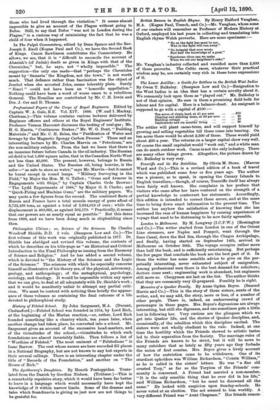Professional Papers of the Corps of Royal Engineers. Edited by
Captain W. A. Gale, R.E. Vol. XIV. 1888. (W. and I. Mackay, Chatham.)—This volume contains various lectures delivered by Engineer officers and others at the Royal Engineers' Institute. Professor Vernon Harcourt discusses the testing of coal-gas ; Mr. H. G. Harris, "Continuous Brakes ;" Mr. W. G. Dent, "Building Materials ;" and Mr. C. H. Beloe, the "Purification of Water and Sewage by the Magnetic Spongy Carbon Process." These and an interesting lecture by Mr. Charles Marvin on "Petroleum," are the non-military subjects. From the last we learn that there is an immense future before Canada in the oil industry. The Russian oil-field is but 1,600 square miles, that in the Canadian North-West not less than 40,000. The present, however, belongs to Russia and the United States. The Russian oil, being heavier, is the safer—" as safe to store as water," says Mr. Marvin—but it cannot be burnt except in round lamps. "Military Surveying in the Field," by Major the Hon. M. G. Talbot ; "Guns and Armour in Engagements with Ships," by Captain Charles Orde Browne ; "The Lydd Experiments of 1888," by Major G. S. Clarke ; and "Quick-Firing and Machine Guns," are the military papers. We may quote a few figures from the second. The combined fleets of Russia and France have a total muzzle energy of guns afloat of 3,722,438 tons, as against a total of 3,634,019 of ours ; while the displacement is 480,095, as against 502,170. "Practically, it means that our powers are as nearly equal as possible." But this dates from 1888, and we have been doing much in shipbuilding since then.


































 Previous page
Previous page